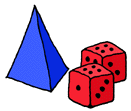 PLAYING
MAGIC WITHOUT A FULL TWO DECKS
PLAYING
MAGIC WITHOUT A FULL TWO DECKS PLAYING
MAGIC WITHOUT A FULL TWO DECKS
PLAYING
MAGIC WITHOUT A FULL TWO DECKSHow many times has this happened to you? You go over to a friend's house to play Magic. You're all set to try out the new deck you finished building at 2 AM the night before. But he's not ready. He still has to finish building his deck. So you sit around for an hour watching TV while he paws through his boxes of cards. And when you finally do play, you discover that your deck is hopelessly outmatched by his deck of Drudge Skeletons and Bad Moons. So you have to go off and retool your deck while he sits around watching TV. Now the evening's half shot and you've barely played a game. So, where's the fun?
Because of these difficulties, I developed an alternate way of playing Magic. Now, when my wife and I play, we just use one big deck, rather than each having a deck of our own. I deal us each the usual 7 cards, then the deck goes in the middle and we each consider it our library. We share the discard pile too. And if we run out of cards in the draw pile, we just shuffle and keep going.
To some, this might seem absurd, perhaps even blasphemous. "What do you mean, not have your own deck?" For most people, that's what the game is all about: building a deck, then using it. The game has two parts: First, there's the pre-game, in which you build your own deck, then there's the actual game, in which you use that deck against someone else's.
I will readily admit that deck construction is one of Magic's most important design features. Some people spend more time designing and re-designing their deck than they spend actually playing with it. But even so, I think the whole deck building aspect of Magic is the main thing that's keeping Magic confined to the world of gamers.
Lately, I've been seeing these commercials for Magic on TV, and I've looked over the latest expansion, Portal, which has been designed to be easier to learn and targeted more for the mass market than Magic has previously ever been. So although Magic is currently a game played only by gamers, Wizards of the Coast seems determined to change that, to get Magic played in every home in America.
But I think this is going to be difficult. Although they've made some significant changes to Magic with the release of Portal, with learning decks that come in a specific order and a few slight improvements to the card design, I believe that more radical changes to the game must be made in order for it to penetrate the elusive Mass Market. My feeling is that the very things that have made Magic an incredible success in the gamer's market will work against them in the their attempts to expand their audience.
Because although gamers love the whole deck construction phase, most non-gamers won't. First, not everyone enjoys, or even grasps, the issues of deck building. Most people who wish to sit down and play a game want to start playing with as little delay as possible. They don't want to worry over the design of the deck, they just want to start playing. This is an issue that WotC has attempted to address in Portal, with those cards that explain how to build specific decks, but the problem still remains, since Portal is just meant to get players started. The logic seems to be that learning the game, and getting your mind around the concept of building a deck, is the problem, but that once players climb this learning curve, they'll be buying more cards and building new decks just like hardened Magic players.
But the barriers to non-gamers run deeper than this. For even if both players use pre-constructed decks, there is still the problem of the Unlevel Playing Field.
As long as two players have different decks, the loser can end up feeling that they lost because their deck wasn't as good as the opponent's. Of course, when you build the deck yourself, you realize you lost the game during the pre-game, and go back to retool the deck. But if your deck was built by someone else, even someone who really knows how to build a deck, the loser can wind up with a nagging feeling that they were screwed from the outset. And that just doesn't make for fun gaming.
This is why I recommend using a central deck, especially when playing with non-gamers. All those worrisome problems go away - everyone has the same odds of winning, and no one has to worry about building a deck before we start. And indeed, that's the only way I play Magic nowadays.
A final note about deck building before this article comes to an abrupt halt. When playing with a central deck, I recommend a 5 color deck filled with a broad range of cards. This way, there is little chance of me and my opponent ending up with the same types of cards, which would make the game less interesting. My deck has over 150 cards with no duplication at all (not even in the land). It's got lots of really fun, cool cards, but at the same time, doesn't have any of those irritating cards that tend to cause arguments. Five color decks provide the coolest range of options, and while their tendency to be slow starters can be bad in a 2 deck game, it's no problem when both players are drawing from the same deck.
